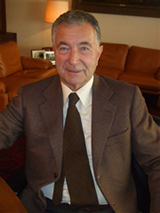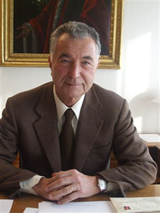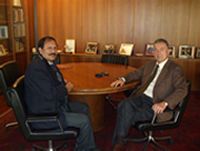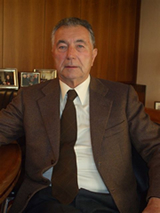 Cavaliere Gianni (short form of Giovanni) Zonin does not get fazed with the criticism that he is a producer of industrial wines. He is quite used to smiling and answering the inquisitives that his strength has always been to gauge the market and produce what the customer wants. The market in the early nineteen sixties demanded wines that were high on alcohol and were cheap wines-in fact, higher the alcohol, more the price they commanded. Later as the trend changed, he also started producing better quality wines and has been doing so since the nineties. Cavaliere Gianni (short form of Giovanni) Zonin does not get fazed with the criticism that he is a producer of industrial wines. He is quite used to smiling and answering the inquisitives that his strength has always been to gauge the market and produce what the customer wants. The market in the early nineteen sixties demanded wines that were high on alcohol and were cheap wines-in fact, higher the alcohol, more the price they commanded. Later as the trend changed, he also started producing better quality wines and has been doing so since the nineties.
The results are evident not only in the higher quality of wines from his winery in Veneto but also in those he bought in the other seven regions of Friuli, Tuscany, Piemonte, Puglia, Lombardy and Sicilia.
‘You tell me whether our quality is better or not?’ he comments when I ask him the typical question about his so-called industrial wines, the repeat of a few years ago when I had met him through my friend Franco Giacosa who as his Technical Director is responsible for assisting him technically to improve the quality of the existing as also the new vineyards or wineries Gianni buys.
Last year Zonin touched aggregate revenues of almost €100 m at the annual growth of 9% when there was a recession in the market, he says. ‘This year we are expecting a year-on-year growth of 10%,’ he says with a look of confidence in his eyes that say he knows that he is undergoing the image makeover slowly but surely.
After all, he is still the biggest family-owned wine producer in Italy, if one goes by the acreage at 1800 hA. Give or take €10-20 m, Antinori is the only producer ahead of him while Frescobaldi trails perhaps by that amount. As a perspective, the ubiquitous Italian conglomerate, Gruppo Italiani Vini (GIV) had revenue of about €300m last year.
Power of Co-operatives
What does he think of the co-operatives in Italy with a lot of muscle and money power-like Caviro and Cavit? He gives his mystical smile and shakes his head . ‘I don’t know how they operate or what they do but 50% of grapes grown in Italy are handled by the co-operatives.’ When I nudge him a bit more, he agrees and says, ‘yes, they are helped financially by the regional governments as also through some funding from EU,’ but ducks for any other information except saying with a polite smile, ‘it is political!’ . ‘I don’t know how they operate or what they do but 50% of grapes grown in Italy are handled by the co-operatives.’ When I nudge him a bit more, he agrees and says, ‘yes, they are helped financially by the regional governments as also through some funding from EU,’ but ducks for any other information except saying with a polite smile, ‘it is political!’
Man who saw the future
Gianni realized very early that there would be a good market for Italian wines in future. He also had the vision that if one if a good producer in Veneto, one could be good in other regions as well. He also knew that if he had to expand, export would be the future and no matter how famous his Veneto wines from Gambellara where Zonin is still headquartered, the buyers would still want wines from Tuscany, Piemonte and other regions.
He was the first producer who branched out into Friuli in 1971 and today with two estates there, he owns over 550 hA, perhaps the biggest vineyards owned by an Italian family producer. The wine estate his forefathers founded in 1821 after being in business for a century before that, had less than 70hA!
Purchasing of wineries and vineyards continued with Tuscany. Again he was the first to have decided to go to Sicily when no producer from the North would dream of entering the region which was quite low on the quality and branding totem. Following the purchase of Feudo Principi di Butera in 1997 were the properties in Maremma and Puglia.
Zonin Goes to USA
‘In 1975-76 we found that the USA was a wonderful market , waiting to be discovered and knew that Italian wines would be in great demand with the huge number of Italian expats,’ says Gianni who decided to buy a property in 1976 in Virginia on the East Coast, known more for its hybrid varieties making foxy wines than the international varieties..
When he engaged a professor from UC Davies to advise him how to best use the property, Gianni was advised to sell the property and go back to Italy as it was impossible to grow Vitis Vinifera varieties and did not give him much chance to succeed. However he persisted, though dropping the initial idea of exporting bulk wine and bottling it in the USA for that market.
He says,’ We are the biggest and most important wine company in Virginia.’ Today the 100 hA Barboursville estate is the most well-known estate known for its international varietal, though Pinot Grigio and Nebbiolo have also been planted successfully from the clones bought in California. ‘Even the White House buys wine from us. We import wines from this winery into Italy but unfortunately, there is not enough production to take care of our demand here,’ rues Gianni.
Of course, USA remains to be an important market for Zonin and an import company Zonin USA handles all imports from the Italian parent company.
Proponent of Low Alcohol
My respect for Gianni went up when I was told that he prefers to make low alcohol wines and in fact when he bought the winery in Puglia in 2000, he chose to produce Salento IGT red wine than Primitivo di Manduria DOC which has a minimum alcohol of 14% by law. A man shrewd enough to follow the market trends, he says,’ We make what the market wants. Earlier in the sixties the wine quality in Italy was measured by the alcoholic strength so the producers emphasized on the alcohol level. Now the trends have changed. People are looking for wines below 14% or even 13%. So we select the regions and choose the winemaking so that we may be able to sell in the market.’
Then what does he think of Robert Parker advocating bold and powerful high alcohol wines?. ‘He is of course, right,’ says Gianni diplomatically. ‘Good red wines can be made only with alcohol levels of 13%, 14% or even 15%. You have to choose between high quality and low alcohol. One has to draw a balance. It also means you have to work very hard in the vineyard- date of harvest, pruning time and frequency are a few of the things you have to worry about before harvesting the grapes.’
‘Of course, Barolo and Amarone are different wines,’ he is quick to point. Amarone at up to 16.5% and Barolo at 15% are quite common’ and the only advice he gives is to keep their level of consumption under check, fully appreciating that the alcohol level should always be monitored for health reasons.
Plans of Expansion
Gianni has not bought a new estate for more than 8 years now. Does it mean he has slowed down? Not exactly, he says. ‘We have an ongoing programme of annually replanting 10 hA. Not only it is expensive, it needs supervision too. Due to the recession, we decided it was not prudent to invest further at this point. But, if we get an opportunity to invest in a good project in a new region in Italy, like Marche, Abruzzo or Umbria, we would consider it,’ he adds.
Any plans of expansion outside Italy? Gianni has been sending his envoys to scout around in Chile, Argentina, Australia and even India. ‘Chile looks the most interesting right now. I like to work in a 100% owned project,’ as I mention the collaboration of Antinori with Ste. Michelle Estates in the US. ‘I am not sure or even saying which is a better way of working, but I only I like to work this way.’
‘The problem in having a project outside Italy is that it requires a lot of time to visit. I can cover any one single estate in Italy in a day by getting up early in the morning and returning late at night. If I were to plan a trip to Chile, I need at least a week to do it.’
Why not India
 Surprisingly, Zonin has been evaluating investment in India as he feels there is going to be a huge demand in future. ‘But unfortunately, the current development is not in the best region- Maharashtra which I feel is a bit too humid for the grapes and the maximum temperature gets too high.’ He is quite clear in his mind. ‘North of Delhi in the foothills of Himalayas.’ When I tell him there are people scouting around in Uttaranchal and Himachal Pradesh, his eyes light up and says, ‘that is the area I am talking about.’ Surprisingly, Zonin has been evaluating investment in India as he feels there is going to be a huge demand in future. ‘But unfortunately, the current development is not in the best region- Maharashtra which I feel is a bit too humid for the grapes and the maximum temperature gets too high.’ He is quite clear in his mind. ‘North of Delhi in the foothills of Himalayas.’ When I tell him there are people scouting around in Uttaranchal and Himachal Pradesh, his eyes light up and says, ‘that is the area I am talking about.’
Gianni does not mind dispensing the valuable information that he would feel more at ease with an area where the maximum temperature does not cross 35° C and does not get colder than -7° C with an annual rainfall between 800 and 1300 mm.
Viticulturist at Heart
Gianni should know. He did his diploma in enology from the prestigious school of Enology in Conegliano, the capital of Prosecco bubbly. Any winemaker must be a good viticulturist, he says adding that ‘in those days, viticulture was an equally important part of the course.’
Being hands-on could be a boon to him and the bane for his 32 winemakers spread all over his estates. It is not easy to fool Gianni because of his background and the vast experience. He can taste a sample and tell the winemaker what needs to be done. It is not a coincidence that his office in the first floor of the swanky building is at the far end of a corridor adorned with glass cabinets containing various shapes of decanters and drinking glasses on both side. Located next to his office are not the cabins of senior managers but the lab so that he may stop by often to taste and study the analyses of various samples from his estates.
Viva Italia and Vini Italiani
Gianni Zonin respects the tradition, history, culture, geography and the general story of wines of each Italian region has to offer. His vision entails forecasting the demand from the hordes of Italian immigrants in countries like the USA, Canada, Australia, Brazil and Argentina etc. They understand the importance of various regions and are big consumers of Italian wines.
One hopes in times to come, the Indian wine industry will also respect the tradition of the terroir and soil and accordingly pitch its wines to the Indians spread as wide as USA, UK, Canada, Australia, South Africa (which has a huge population of Indians settled down for the last many generations, but is otherwise a negligible importer of wines) and practically every country in the world. wide as USA, UK, Canada, Australia, South Africa (which has a huge population of Indians settled down for the last many generations, but is otherwise a negligible importer of wines) and practically every country in the world.
Gianni Zonin the Banker
Where does he find time to look after al the estates? ‘This is only 50% of my activity. The other half I spend as the banker’ he says. Over a decade ago, he was nominated the President of the regional Banca Populare di Vicenza and as the top man he spends an average of 8 hours to expand the activities of the bank within Italy and overseas- he has already opened two branches in Mumbai and Delhi to help finance the Italian companies willing to do business with India and vice versa.
Retirement Plans
Ask the 72- year young Gianni when he plans to retire and he gives you again a mysterious smile,’ I hope never! I am fully fit. Though all my 3 sons are in the business- Domenico and Francesco are already the vice presidents, and the youngest- Michele is also on the Board of Directors. I am gradually relinquishing my day-to-day jobs to them but I hope never to retire,’ he says without hesitation.
Carry on Gianni
Incidentally, the Giovanni name is already on its way to carry on the show. His son Stephen became father last December and named his son, Giovanni-same as Gianni’s grand father did. The new addition to the family is the eighth generation potential vintner.
In the meanwhile, Gianni is carrying on his mission of making as many Italians drink his wine at affordable price as possible. With quality going up gradually with assistance from loyal stalwarts like Franco Giacosa, it does appear that Gianni Zonin is on the right track.
Subhash Arora |